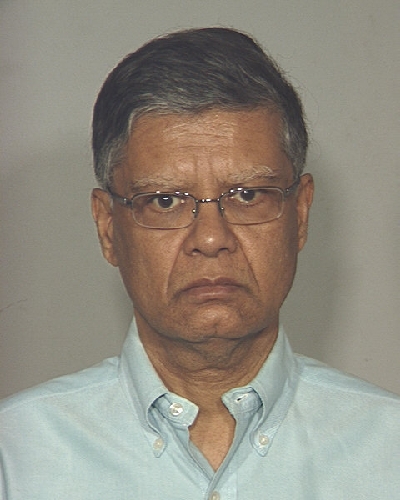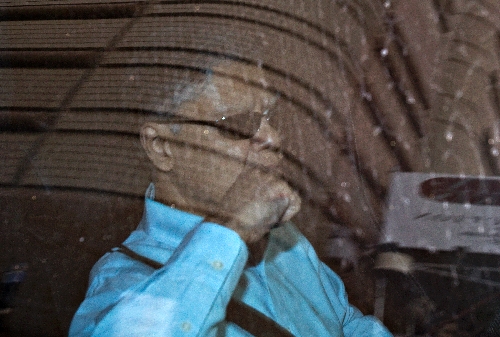Desai, 2 others indicted on 28 counts in hepatitis case
A 28-count criminal indictment unsealed in District Court on Friday charges Dr. Dipak Desai and two of his former clinic workers in the hepatitis C outbreak that turned into one of Southern Nevada's worst medical calamities.
Desai, who once enjoyed strong community regard and political connections, ran the endoscopy clinics where health officials said patients were infected with hepatitis C in 2007 because of unsafe injection practices.
The 28 felony counts against Desai and two of his former nurse anesthetists, Ronald Ernest Lakeman and Keith H. Mathahs, include racketeering, neglect of patients, insurance fraud and performance of an act of reckless disregard of persons or property.
The charges revolve around the cases of seven people health officials say were infected with the potentially deadly hepatitis C virus at Desai's Endoscopy Center of Southern Nevada, one on July 25, 2007, and six on Sept. 21, 2007. All seven infected patients were among the 39 witnesses who testified before the county grand jury that indicted the defendants.
The racketeering count, which draws a maximum 20-year prison term, alleges Desai and the other two defendants carried out a criminal enterprise between June 2005 and May 2008 that falsified anesthesia records during routine procedures at his clinics and submitted false anesthesia records to various insurance companies to obtain money under false pretenses.
For example, in the case of patient Sharrieff Ziyad, the indictment said that Anthem Blue Cross and Blue Shield was billed in excess of the actual cost for the anesthetic and time devoted to the endoscopic procedure.
The indictment also alleges Desai pressured clinic employees into using additional doses of the sedative propofol from single-use vials on more than one patient during procedures, contrary to accepted safety standards. The employees also were alleged to have been pressured into reusing syringes and needles and other medical instruments in violation of accepted safety standards.
The indictment accuses Desai of creating an environment at his clinics that limited the use of medical supplies necessary to conduct safe endoscopic procedures and rushed those procedures on a daily basis at the expense of patient safety -- all for the purpose of "enhancing" financial profits.
As part of the unsafe environment created by Desai, the indictment alleges, employees scheduled too many procedures a day and were not properly trained in how to clean endoscopy scopes between procedures.
District Attorney David Roger called the indictment, the result of a more than two-year investigation, "an important case for the community."
"Over 100,000 local patients were treated at these centers," Roger said. "It's important for us to ensure the safety of patients who place their trust in medical providers."
Patty Aspinwall, whose hepatitis C infection was genetically linked to the others on Sept. 21, 2007, said she was pleased that the indictment has finally come. She and her lawyer, Billie-Marie Morrison, have been fighting her case against Desai for months in District Court.
"I think it's about time," she said. "I'm happy to know it. I was beginning to wonder if he was going to get away with what he did. For 2½ years, he's gotten away with everything, been able to live the way he wanted to, while so many other people had to suffer."
Las Vegas police officer Kenny Nogle, who was diagnosed with hepatitis C after receiving a colonoscopy from Desai, called him "a bad man all around."
"If I had my choice, he'd never see the streets of Las Vegas again," Nogle said. "Somebody needs to be made an example so other doctors realize that patient safety needs to come first, not money."
As the indictment was unsealed in court, Chief Deputy District Attorney Mike Staudaher, who presented the case to the grand jury, sought $10 million bail for Desai, saying the embattled physician has access to "large quantities" of cash and is a flight risk now that he has been charged.
Staudaher told District Judge Elissa Cadish that Desai has at least $30 million in assets and has bragged that he could gain access to as much as $180 million.
The prosecutor said Desai received an $881,000 tax refund for 2008 and had enough cash to pay his bankruptcy lawyer $250,000.
"He could leave the country at a moment's notice," Staudaher said.
But Desai's chief criminal lawyer, Richard Wright, said Desai's money is tied up in bankruptcy court and that he is too sick to flee the country, the result of several strokes since 2007.
Cadish set bail at $1 million but gave Desai until Monday to post it. Cadish ordered him to surrender on an arrest warrant for booking at the Clark County Detention Center before being released to house arrest until he posts bail. He also must surrender his passport.
The judge set bail at $500,000 each for Lakeman and Mathahs.
Attorney Ed Bernstein, who represents two of the infected patients, said the indictment should open the door for key witnesses who previously refused to provide information to step forward in the massive civil litigation.
"We're hoping that a lot of evidence we've been prohibited from getting will now be available to us," Bernstein said.
One witness who might now be available is Tonya Rushing, the former office manager for Desai at the endoscopy center. Rushing, listed as one of the last witnesses to testify before the grand jury, is said to be cooperating with prosecutors. Roger said she was given limited immunity in exchange for her testimony, which means anything she told the grand jury cannot be used against her. Rushing previously asserted her Fifth Amendment right against self-incrimination and refused to answer questions at civil depositions.
Two of Desai's former partners, Dr. Clifford Carrol and Dr. Eladio Carrera, also were given limited immunity in exchange for their testimony, Roger said.
Rushing, Carrol and Carrera were not named in the indictment.
Attorney Will Kemp, who represents patients suing Desai, said he intends to press for the testimony of Rushing and Desai's former partners.
"They can't take the Fifth now," Kemp said. "This can only help our case."
The criminal investigation, which began shortly after health officials disclosed the hepatitis C outbreak in February 2008, was one of the largest undertaken by Las Vegas police. Desai came under scrutiny after the Southern Nevada Health District linked cases of hepatitis C to the Endoscopy Center of Southern Nevada on Shadow Lane.
Officials notified 40,000 former clinic patients about possible exposure to blood-borne diseases because of unsafe injection practices. More notifications followed for patients of a sister clinic, Desert Shadow Endoscopy Center.
Local health officials blamed the outbreak on nurse anesthetists reusing propofol vials between patients after they had become contaminated by syringes that were reused on patients with hepatitis C.
Clinic staff told health investigators they were ordered by administrators, principally Desai, to reuse supplies and medications to save money, according to a city of Las Vegas letter suspending the Shadow Lane clinic's business license.
In the months following the hepatitis outbreak, Desai's lawyers have said he was in ill health because of a series of strokes. He has given up his license to practice medicine and filed for bankruptcy. He also is a defendant in dozens of medical malpractice lawsuits involving several thousand former patients.
Review-Journal reporters Brian Haynes and Paul Harasim contributed to this report. Contact Jeff German at jgerman@reviewjournal.com or 702-380-8135 or read more courts coverage at lvlegalnews.com.
Desai indictment (2 MB)


















